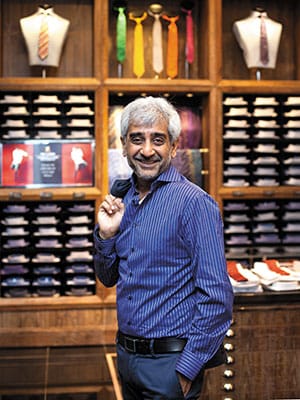
Buying Luxury is buying another person's Lifestyle: Darshan Mehta
Darshan Mehta, CEO, Reliance Brands, shares his perspective on the evolution of the luxury business in India
As chief executive of Reliance Brands, Darshan Mehta has had a ringside view of the country’s fledgling luxury market. Apart from brands like Diesel and Thomas Pink, it retails Paul & Shark and Ermenegildo Zegna as its two marquee labels.
Q. The well-heeled customer would still prefer to shop in London and Dubai. Why?
The customer has not stopped shopping abroad, but it has reduced. For instance, in the purchase of suits that require after-sales service—those are easier to avail of in India. But the same individual will still shop abroad when he’s on vacation. Shopping is also a way of life—a pastime. A woman customer tends to look for newness, seek a brand that isn’t available here. She wants to walk into a party certain she is the only one wearing a particular brand.
When luxury brands entered China, there was an explosive growth with sales doubling every year for about four to five years. That hasn’t happened in India.
Luxury arrived in India in the early 2000s—the Emporio Mall (Delhi) opened in 2008. And we continue to be 8-10 years behind China on many parameters.
Q. How does luxury spending in India change during a slowdown?
When the last slowdown happened, we didn’t have a luxury base. Now Burberry has seven stores in India. If you look at all the key brands, there is more of a critical mass. And I admit I am more worried about increasing the prices now than I was before. But one thing that won’t get impacted is the wedding segment. Even in 2008, that was a category that held up. Marriage spending in India is premeditated, a concept that doesn’t exist in China.
Q. How do other cultures react to slowdowns?
China doesn’t react at all as luxury there has already reached a point where it is for personal enjoyment and not for flaunting. A Rolex watch does not announce a new status in life; it is a matter of personal aesthetic whether you own a Rolex or something else.
The US didn’t have the aristocracy that is found in Europe, which is in the twilight zone. Economic growth hasn’t happened there but recession has not hit them either. By the ‘twilight zone’ I mean that luxury items are still seeing a jump. Bespoke shoes have seen huge growth.
Q. When do you see a true luxury brand coming out of India?
When people buy luxury, they are symbolically buying another person’s lifestyle. Two percent may buy it for the sheer craftsmanship but the rest do it to symbolically live another life. Possibly in the next century, when you truly have wealthy Indians, you can create niche brands. But will it become a Cartier, which has been consumed by the wealthy over the past century? That is what luxury consumption is about. This will take time to happen in India.
(This story appears in the 30 November, -0001 issue of Forbes India. To visit our Archives, click here.)






